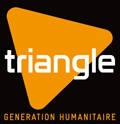The collapse of the communist State was accompanied by the closure of many factories and mass layoffs in the Public Sector. The unemployment rate became extremely high (up to 90% in some areas), and rural exodus intensified. The economic and social situation became catastrophic, especially regarding the youth coming from poor families living in neglected areas. These youth, left to themselves without any vocational training, often lived on the streets.
From this observation, Triangle Génération Humanitaire decided to work with teenagers living on the margins of society, through the creation of a vocational training center for young people aged 14 to 18. The FERILASSES center (training for children on the street and local helpers / situation analysis / economic and social support) opened its doors on August 4, 1997. It provided a suited general education program as well as apprenticeship sandwich courses (with the support of Albanian craftsmen), concerning professional activities for which there was a real demand and a shortage of skilled labor (sewing, catering, hairdressing, mechanics, etc.). The training was validated by the Albanian government. The project was conducted in partnership with the association Useful to Albanian Women, which took overthe project in full autonomy in 1999.
Clashes in Kosovo between Yugoslav troops and Albanian separatists and NATO intervention in the region from March 1999 onwards resulted in the exodus of numerous Kosovar refugees who have been spontaneously sheltered by Albanian families.
TGH decided to support these low-income host families. The program started in April 1999 and lasted 4 months, during which 23, 000 packs (food and hygiene items) have been distributed to Albanian families.
Meanwhile, TGH started a program of rehabilitation (insulation works, renovation of sanitary facilities) and equipment (furniture and school supplies) for eight schools in Elbasan, in order to enable young Kosovar refugees to take school remedial classes.
After the departure of Kosovar refugees, Albanian schoolchildren continued to enjoy the benefits of these works. The maintenance of the premises was ensured by a committee formed by parents, school staff and education officials.
In October 2001, TGH started a program to boost the growing of potatoes in the district of Elbasan (Municipality of Steblevle). This project was part of an agricultural economic development project, aiming to improve the local production and the food situation of rural populations in Albania. It enabled farmers to restart a traditional income-generating production, by providing seeds used to supply the local market with potatoes for consumption and first-generation seeds. This program was completed by a technical training course and adequate support to the potato growers association in this region.
TGH continued its activities in Albania, and implemented in December 2002 an agricultural and economic development project in the municipality of Miras (Korça region). This program supported three local associations. The first one, an association of farmers, "Mirasi", aimed to facilitate the selling of the city's agricultural production (onions, beans and apples) on the Albanian market, and to improve the quality and quantity of the yield and of the means of production (transport, packaging, mechanization, etc.)
The second association, "Progressi", enabled women to create income-generating activities based on local products.
And finally, a fishing association generated additional income for farmers via the fishing activity (selling of fish, organizing of activities on the lake, etc.). In Stebleve as in Miras, TGH's methodology was to strengthen civil society through the creation of responsible rural associations working side by side to reach the objectives fixed during consultations and group discussions.
